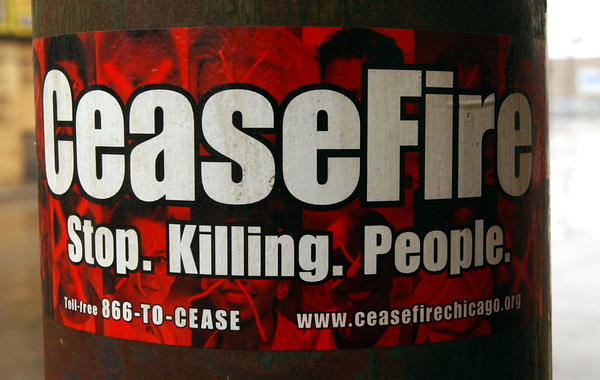Over 3,500 people were shot ––over 600 fatally–– in Chicago in 2017.
Such a statistic can leave a bitter taste, especially when many Chicagoans are working tirelessly to dispel narratives painting their city as a dystopian nightmare void of human decency. Dynamic community groups consistently create events promoting violence prevention. “Stop the Violence” rallies are the norm. The slogan “Put the Guns Down!” is echoed before radio programs cut to commercial. There is no escaping conversation about violence in this city.
 There have always been initiatives pushing solutions to gun violence, and any person can surmise that matters would be worse without these efforts. An example of one of these causes is CeaseFire.
There have always been initiatives pushing solutions to gun violence, and any person can surmise that matters would be worse without these efforts. An example of one of these causes is CeaseFire.
CeaseFire is an organization that stems from Dr. Gary Slutkin’s Cure Violence Health Model. Cure Violence’s approach to violence is to treat it as a contagion––something that can be cured. CeaseFire practices this framework by using formerly incarcerated people and former gang members to quell neighborhood conflict before it bursts into violence.
Their work is highlighted in the critically acclaimed documentary The Interrupters.
Studies have shown CeaseFire to be effective. In 2012, the FBI labeled Chicago as the nation’s murder capital after the city tallied over 500 homicides. That same year, CeaseFire took on work in the Woodlawn and Lawndale communities and drastically reduced the violence in those neighborhoods.
However, despite its effectiveness, CeaseFire has been pretty absent for the past two years due to landing in financial straits, mainly because of the political chess match between Republican Gov. Bruce Rauner and Democrats who hold majority seats in the Illinois General Assembly. Not only did the budget impasse halt CeaseFire’s funding, but also Gov. Rauner’s executive order to freeze discretionary spending left CeaseFire without cash for its 2015 budget.
“For two years, there was no [state] budget. Ceasefire was operating on ‘philanthropic money,’” says Glenn Reedus, a Communications Lead for the organization.
But this is not the first time a politician has interrupted CeaseFire’s funding. Almost a decade ago, Gov. Rod Blagojevich cut $6.2 million allocated to CeaseFire in an effort to push his own anti-violence initiatives. In 2013, a Ceasefire’s North Lawndale office had to close after a $1 million city grant from the Chicago Department of Health was exhausted. Community activists turned their eyes to Mayor Rahm Emanuel to restore the organization’s funding. Those calls were never answered.
Additionally, in January of this year, four alderpersons of City Council’s Black Caucus asked the mayor to put $5 million into CeaseFire after the surge in violence in 2016 (Chicago had over 800 homicides in 2016). The mayor never answered the calls for CeaseFire, even after 500 people signed a change.org petition signaling its need. Funding was never reinstated and resulted in CeaseFire closing its doors.
The reemergence of CeaseFire began a year ago.
“A year ago they had the emergency funding, CeaseFire. They got the money in October but it had to be spent by December. That allowed for the hiring and training of 135 new workers. Those workers include: The Violence Interrupters, case managers, outreach workers, and hospital responders,” says Reedus.
The money that Reedus is referring to is from last year’s stopgap budget from Springfield. But now that a new budget is enacted, CeaseFire looks to make its full return.
In October, Cure Violence held its first ever “Gala Event” that resulted in volunteers raising over $200,000. Chicago music icon Ramsey Lewis was the event’s honoree based on his community work. Lewis gave an impassioned speech about the importance of CeaseFire and his upbringing into community activism.
The money raised from the gala will be put toward The Interrupters program––street responders that often wear reflective vests on neighborhood corners. A hiring panel that consists of CPD officers and other CeaseFire personnel vets, the The Interrupters, and all CeaseFire employees.
Ceasefire directly manages sites in South Shore, Grand Crossing, and Englewood. It also works in conjunction with community organizations in neighborhoods such as Uptown, Lawndale, Humboldt Park, Auburn Gresham, Chatham, and Roseland.
Look for Ceasefire to take 2018 by storm and reemerge as a disruptor of violence.
